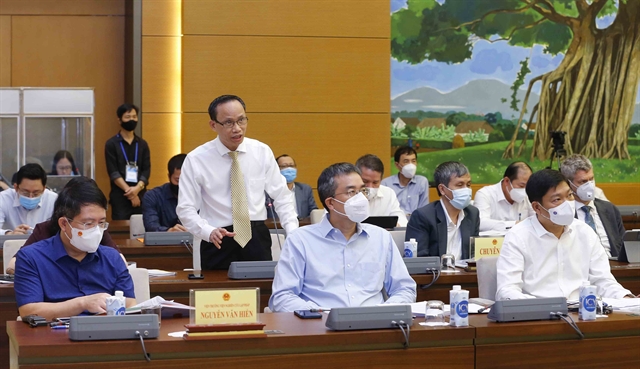 Society
Society


|
| Dr Cấn Văn Lực, chief economist of the Bank for Investment and Development of Việt Nam, a member of the National Financial and Monetary Policy Consultation Council, speaks at the event. — VNA/VNS Photo |
HÀ NỘI — Socio-economic experts recommended three phases for post-COVID recovery and development of Việt Nam at a consultation yesterday.
The consultation with experts on socio-economic affairs in Hà Nội, under the chair of National Assembly (NA) Chairman Vương Đình Huệ and Vice Chairman Nguyễn Đức Hải, drew the participation of NA agencies, ministries, and ministry-level agencies; representatives of international organisations in Việt Nam along with economic experts and enterprises.
Dr Trần Thị Hồng Minh, head of Central Institute for Economic Management (CIEM), said Việt Nam’s economy still had to face a number of challenges and serious consequences of the pandemic. Export markets have applied technical measures to limit imported goods, including Vietnamese goods. The risk of supply chain disruption has significantly increased costs for exporters as well as domestic commercial enterprises.
According to CIEM prediction, Việt Nam’s economic prospects will be influenced by a number of factors including the ability to contain the pandemic, disbursement progress of public investment, the ability to guarantee production recovery and to keep pace with the implementation of an extensive programme of economic recovery and development, as well as the ability to take advantage of opportunities from the recovery momentum of the world economy.
Dr Minh proposed prioritising COVID-19 prevention and control work along with accelerating vaccination and conducting a comprehensive programme on post-COVID recovery and development.
She said three phases of the recovery should be mapped out. The first phase in the first quarter of 2022 will be the time for pandemic prevention and control along with macro-economic policies including accelerating disbursement of public investment in order to support businesses to stabilise themselves in this difficult time.
In the second phase until 2023, after the pandemic is controlled, Việt Nam should loosen macro-economic policies to stimulate demand for the economy, and at the same time create a driving force for businesses.
Macro-economic policy should be normalised in phase 3 (after 2023) along with strengthening the macro-economic foundation and promoting economic institutional reform.
CIEM proposed applying macro-economy policies in a flexible manner to respond to unfavourable development of the global and regional economies. Việt Nam should also diversify export activities based on studies on markets and products that have potential in the pandemic.
Dr Cấn Văn Lực, chief economist of the Bank for Investment and Development of Việt Nam, a member of the National Financial and Monetary Policy Consultation Council, said in response to COVID-19, in 2020, Việt Nam launched four supportive packages worth about VNĐ1.1 quadrillion.
But the total real value or the total cost committed by the Government and credit institutions was estimated at VNĐ184.7 trillion, equivalent to 2.94 per cent of GDP in 2020, he said.
The implementation of the fiscal and social security package is still slow. Only about 46 per cent of the value of the fiscal package and 63 per cent of the social security package have so far been distributed, which has affected the efficiency of the supportive policies for businesses and people, he said.
This was blamed on complicated procedures and unclear conditions for those who are qualified to receive the support, he said.
He proposed Việt Nam accelerate distributing supportive packages. The Government needs to issue an order to accelerate restructuring the economy to be able to allocate resources more effectively.
World Bank Country Director for Việt Nam Carolyn Turk said Việt Nam needed to strengthen its resilience through a strong and flexible social assistance system. To do this, it is necessary to invest more in social assistance programmes, build a large-scale social registry agency and apply digitalisation to quickly identify vulnerable people, scale up electronic payments to effectively reach the identified beneficiaries.
Terence Jones, Acting Representative of the UNDP in Việt Nam, said: “Private consumption will be suppressed in the second half of the year in Việt Nam, which will reduce incomes, employment and tax revenue. To counter the effects of forced saving, UNDP proposes a cash assistance programme of 5 per cent of quarterly GDP, to be implemented as soon as possible in the final months of 2021,” he said.
The emphasis of this programme should be on rapid disbursement, especially to people who are currently suffering from extremely difficult circumstances due to the pandemic. A universal cash transfer for the elderly and children would achieve this immediate objective. Also, medium-term support policies need to be designed now to prepare for the possibility of further lockdowns and social distancing measures in the future. — VNS